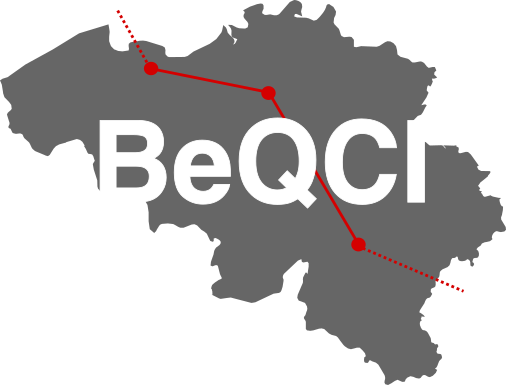Introducing Quantum Communication in Belgium
Quantum communication is one of the new emerging quantum technologies that taps directly into quantum physics, which is the physics of the microscopic world. In recent times our physical grasp on this microscopic world has reached a new level, with the ability to control and detect individual particles, like atoms, electrons and photons. This makes it possible to foster the different quantum principles and phenomena – often at odds with our everyday experience – for developing new technological applications. Specifically, in the context of quantum communication, it was discovered that quantum physics allows for quantum key distribution (QKD), a new type of cryptography.
The essence of QKD protocols is that the natural laws of quantum physics itself, with for instance the ‘no-cloning principle,’ according to which quantum information cannot be copied, provide a framework for secure communication. In our global digital world secure communication is of course of primordial importance. Furthermore, future quantum computers could break some of the classical cryptographic schemes that are currently widely used. This motivated the EU to launch EuroQCI, a massive technological and scientific effort for developing a global European quantum communication network, for which BeQCI forms the Belgian branch. In the short term this network will primarily involve QKD applications. The longer term vision is that such network could serve as the backbone for a quantum internet, providing long-distance connections between quantum devices like quantum computers and quantum sensors.
BeQCI
The BeQCI project starts in January 2023 and will run over a period of 30 months. A crucial task is the deployment of a quantum communication network in Belgium. Several quantum links along dedicated optical fibers with a selection of different QKD systems will be realized, between different nodes all over the country (Brussels region, Leuven, Ghent, Hasselt, Redu) and in different topologies. In addition, we will explore the potential interfacing with space quantum communication networks and the possibility for (long distance) QCI-links with neighbouring Member States Luxembourg and the Netherlands.
In tandem with the deployment we will invite governmental agencies, non-profit institutions and private companies to realize different use cases for QKD communication of sensitive information, between datacenters, hospitals and banks. This will allow the validation and assessment of the practical usability of different QKD systems and protocols for quantum key distribution. Contact us at info@beqci.eu if you want to explore the possibilities for your organization.
BeQCI will also carry out several research lines that follow three main themes: insuring the security of the whole communication chain, reducing the cost of QKD-systems, increasing the length of links. At the hardware side the goal is to develop and integrate components like receivers (for CV-QKD), chip-scale transmitters (for MDI-QKD) and frequency converters (for interfacing with solid spin qubit states in diamond). At the software side the aim is to design novel QKD protocols and classical (post-quantum) cryptographic protocols for authentication; and to improve the security analysis.
Furthermore, the project also entails a training and dissemination part. We will educate potential users from the administrative, industrial and governmental sectors on QKD. There will also be a broader effort to educate students on quantum technologies (including QKD). Moreover, several outreach activities are planned for introducing the broad public to the wonders of the quantum world.
Finally, to build a sustainable ecosystem for future quantum communication we will actively research possible cooperations with relevant initiatives at the European, national and regional scales. Besides the already mentioned intended QCI connections with Luxembourg and the Netherlands, we will explore possible cooperation with other national QCI initiatives. Also broader opportunities for collaboration with companies and agencies involved in QKD, space-technology and cybersecurity will be investigated.

